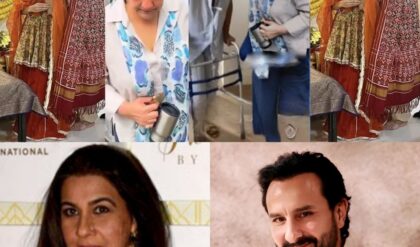Malaika Arora, a prominent figure in the Indian entertainment industry, is no stranger to the limelight. An actress, dancer, and model, she has been a staple in Bollywood for decades. Recently, she attended a kids’ event, where her choice of attire sparked considerable controversy and led to a wave of online trolling. The dress she wore, which showcased her figure, also highlighted her stretch marks, drawing both admiration and criticism. At 52, Malaika continues to defy age norms in the industry, but her experience at this event has opened up discussions about body image, aging, and societal expectations.
Malaika’s outfit for the children’s event was a bold choice. She opted for a form-fitting dress that accentuated her figure, which many fans celebrated as a testament to her confidence and fitness. However, the attention quickly shifted from her stylish appearance to the visible stretch marks on her body. While some praised her for embracing her natural form, others took to social media to express their disapproval, labeling her outfit as inappropriate for the occasion. This polarizing response highlights the ongoing struggle women face regarding body image, especially in an industry that often promotes unrealistic beauty standards.
The backlash against Malaika’s outfit raises critical questions about societal perceptions of women’s bodies, particularly for those in the public eye. In a culture that often celebrates youth and perfection, women like Malaika who choose to embrace their bodies, including imperfections like stretch marks, can face harsh judgment. The trolls who criticized her did not take into consideration that stretch marks are a natural part of many women’s bodies, often resulting from various life changes such as pregnancy, weight fluctuations, or simply the passage of time. The scrutiny she faced serves as a reminder of the unrealistic standards that many women are expected to meet, often leading to feelings of inadequacy and self-doubt.
Malaika’s response to the trolling has been largely one of resilience and positivity. She has always been vocal about body positivity and self-acceptance, often sharing her fitness journey on social media. Rather than succumbing to the negativity, she has used her platform to promote the idea that beauty comes in all forms and that women should celebrate their bodies, flaws included. Her attitude towards the criticism reflects a broader movement within society to challenge and redefine beauty standards. Many fans have rallied behind her, applauding her for her confidence and for setting an example for women of all ages.
The incident also highlights the double standards that exist in the entertainment industry. Male celebrities often evade similar scrutiny when it comes to their bodies. While a male actor might be praised for his physique, a female actress is frequently judged harshly for any sign of aging or imperfection. This disparity underscores the need for a cultural shift towards embracing diversity in body types and appearances, regardless of gender. The conversation surrounding Malaika’s outfit serves as an opportunity to challenge these outdated norms and advocate for a more inclusive understanding of beauty.
Social media plays a significant role in shaping public opinion, and in this case, it acted as a double-edged sword. While it provided a platform for critics to voice their opinions, it also allowed supporters to defend Malaika and advocate for body positivity. Hashtags and campaigns promoting self-love and acceptance have gained traction in recent years, encouraging individuals to embrace their bodies as they are. The support Malaika received online demonstrates that many people are eager for change and are willing to stand up against body shaming.
The backlash against Malaika also raises important discussions about the types of events celebrities attend and how they dress for those occasions. While it is common for stars to wear glamorous outfits to events, a children’s function might carry different expectations regarding attire. Critics argued that her dress was inappropriate for the setting, suggesting that celebrities should dress more conservatively when attending events geared towards children. However, this expectation can be seen as another form of policing women’s bodies and choices, further complicating the narrative around female empowerment and self-expression.
In the wake of this controversy, it is essential to recognize the impact that such discussions can have on women’s self-esteem and body image. For many, seeing a public figure like Malaika confidently showcasing her body can serve as inspiration. However, when that same figure is subjected to harsh criticism, it can perpetuate feelings of insecurity among countless women who struggle with similar issues. The cycle of judgment and shame surrounding women’s bodies must be addressed, as it only serves to reinforce negative self-perceptions.
Malaika’s situation also opens up broader conversations about aging in the public eye. At 52, she continues to work tirelessly in the entertainment industry, often challenging the stereotypes associated with aging, particularly for women. Her presence at a children’s event, dressed in a way that reflects her personal style, signifies that women can embrace their identities and express themselves regardless of societal expectations. This defiance against conventional norms is something that many women find empowering and relatable.
Moreover, the discussion surrounding Malaika’s dress can lead to an examination of how society can foster a more supportive environment for women of all ages. Encouraging body positivity, celebrating diversity in body shapes and sizes, and promoting a culture of acceptance can help dismantle the harmful narratives that contribute to body shaming. By shifting the focus from criticism to empowerment, society can create a space where women feel valued for who they are, rather than how they look.
In conclusion, Malaika Arora’s experience at the kids’ event serves as a poignant reminder of the ongoing battle against body shaming and societal expectations of women. While she faced trolling for her choice of attire, her response and the support from her fans highlight the power of resilience and self-acceptance. The incident invites a broader conversation about the need for cultural change, where all bodies are celebrated, and women are free to express themselves without fear of judgment. As more women like Malaika continue to challenge norms and advocate for body positivity, there is hope for a future where self-love and acceptance triumph over criticism and negativity. Ultimately, it is essential to recognize that beauty is not defined by perfection but by the confidence and authenticity that each individual brings to the table.
Watch video:





